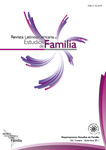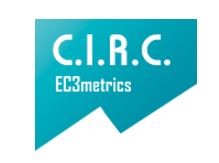Authors
Abstract
Abstract: Migration usually triggers a whole series of transformations and reconfigurations in the family. This fact, for obvious it may seem, has not received special attention in the literature on migratory movements. The traditional consideration of the family and the relationships among its members as a separate sphere from the labor and productive areas has much to do with this lack of attention.
The family has been associated exclusively to the field of reproduction, to the world of women and to the private space. However, both the transnational perspective and the gender mainstreaming are showing how this view is insufficient to analyze contemporary migratory movements. Thus, based on a qualitative methodology (semi-structured in depth interviews), the main objective of this article is the analysis of the continuities and changes that take place in the gender identities, practices and transnational family dynamics of the Colombian people, after their migration and their settlement in the Basque Country (Spain). For that purpose, we will introduce the theoretical framework related to transnational families first, to continue later approaching the genderrelations between couples as well as in parent-child, in the distance and once regrouping has taken place.
Keywords:
References
Castells, Manuel. 1997. La era de la información: economía, sociedad y cultura. Vol. II: El poder de la identidad. Madrid: Alianza Editorial.
Cruz, Pilar, Adriana González y Rocío Medina, coords. La diáspora colombiana. Derechos humanos y migración forzada Colombia-España 1995-2005. Sevilla: ArCiBel, 2008.
Ehrenreich, Barbara y Arlie R. Hochschild, eds. Global woman: Nannies, maids and sex workers in the new economy. Nueva York: Metropolitan Books, 2003.
Garay, Luis Jorge y María Claudia Medina. 2009. La migración colombiana a España. El capítulo más reciente de una historia compartida. Madrid: Ministerio de Trabajo e inmigración.
García Borrego, Iñaki. 2010. Familias migrantes: elementos teóricos para la investigación social. En Familias, niños, niñas y jóvenes migrantes. Rompiendo estereotipos, coord. Grupo interdisciplinario de investigad@res migrantes, 69-81. Madrid: Iepala.
Grasmuck, Sherri y Patricia Pessar. 1991. Between two islands: Dominican international migration. Berkeley: University of California Press.
Itzigsohn, José y Silvia Giorguli-Saucedo. 2005. Incorporation, transnationalism and gender: immigrant incorporation and transnational participation as gendered processes. IMR 39, No. 4: 895-920.
López Montaño, Luz María. 2009. Familias transnacionales: oportunidad y cambio en contexto migratorio. Manizales: Universidad de Caldas.
Massey, Douglas S. 1990. Social structure, household strategies, and the cumulative causation of migration. Population Index 56: 3-26.
Micolta, Amparo. 2007. Inmigrantes colombianos en España. Experiencia parental e inmigración.
Revista Latinoamericana de Ciencias Sociales, Niñez y Juventud 5, No.1, http://www.umanizales.edu.co/revistacinde/index.html (Recuperado el 15 septiembre 2010).
Mingione, Enzo. 1994. Las sociedades fragmentadas. Madrid: MTAS.
Mummert, Gail. 1999. Juntos o desapartados: migración transnacional y la fundación del hogar. En Fronteras fragmentadas, comp. G. Mummert, 451-473. Zamora: COLMICH/CIDEM.
Oso, Laura. 2008. Migración, género y hogares transnacionales. En La inmigración en la sociedad española: una radiografía multidisciplinar, coords. Joaquín García Roca y Joan Lacomba, 561-586. Barcelona:Bellaterra.
Parella, Sònia. 2007. Los vínculos afectivos y de cuidado en las familias transnacionales. Migrantes ecuatorianos y peruanos en España. Migraciones Internacionales 4, No. 2: 151-188.
Pedone, Claudia y Sandra Gil. 2008. Maternidades transnacionales entre América Latina y el Estado español. El impacto de las políticas migratorias en las estrategias de reagrupación familiar. En Nuevos retos del transnacionalismo en el estudio de las migraciones, coords. Carlota Solé, Sònia Parella y Leonardo
Cavalcanti, 149-176. Madrid: OPI.
Portes, Alejandro. 2005. Convergencias teóricas y evidencias empíricas en el estudio del transnacionalismo de los inmigrantes. Migración y Desarrollo 1:2-19.
Posso, Jeanny y Fernando Urrea. 2007. La migración internacional y los cambios en las relaciones de género y estructuras de los hogares colombianos: la migración colombiana hacia España. Papers 85:109-133.
Puyana, Yolanda, Julieth Motoa y Adriana Viviel. 2009. Entre aquí y allá. Las familias colombianas transnacionales. Bogotá: Fundación Esperanza.
Rivas, Ana María y Herminia Gonzálvez, eds. Familias transnacionales colombianas: transformaciones y permanencias en las relaciones familiares y de género. Madrid: Catarata, 2010.
Salazar, Rhacel. 2001. Servants of globalization. Women, migration and domestic service. California:Stanford University Press.
Sassen, Saskia. 2003. Contrageografías de la globalización. Género y ciudadanía en los circuitos transfronterizos.
Madrid: Trafi cantes de Sueños.
Stark, Oded. 1984. Migration decision making: A review article. Journal of development economics 14: 251-259.
Vertovec, Steven. 2004. Trends and impacts of migrant transnationalism, policy and society. Working Paper 3, Centre on Migration, University of Oxford.
Vicente, Trinidad L. 2007. La inmigración latinoamericana en España. En Migración internacional y desarrollo en América Latina y el Caribe, eds. Paula Leite, Susana Zamora y Luis Acevedo, 89-123, México: Consejo Nacional de Población y Secretaría de Gobernación.
Villegas, Natalia. 2008. Social impacts of Colombian migration to Spain: Women’s changing position within the now transnational family. Londres: University of London.

 PDF (Español)
PDF (Español)
 FLIP
FLIP




















